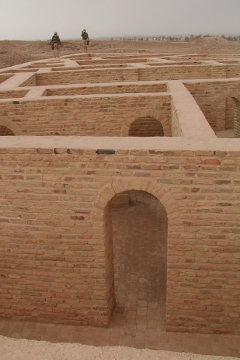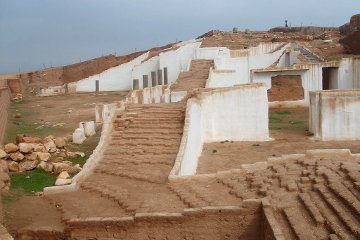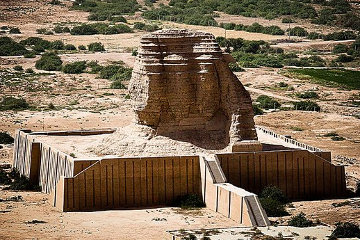Abraham and Ur
In last week's article about the discovery in Bristol of a box containing objects from Ur I referred to Woolley's identification of a house in Ur as "Abraham's House" and several people have written to me, requesting further information.
According to the Biblical statement in 1 Kings 6:1, the Children of Israel came out of Egypt 480 years before Solomon's foundation of the temple in Jerusalem. This would put the Exodus around 1445 BC. The Bible records that Abraham lived approximately 400 years before the Exodus, so that would place him around 1845 BC. When Sir Leonard Woolley excavated a stratum which he dated to that time, he found a number of houses that were not large enough to be royal palaces but which were certainly larger than the slums occupied by the poor people in Ur. On the assumption that Abraham was a wealthy merchant, he picked on of these houses more or less at random and publicised it as "the House of Abraham".

| |
| The Iraqi Department of Antiquities has rebuilt the house claimed to be the birthplace of Abraham so that it looks nothing like the building excavated by Woolley. |
These houses showed a remarkable continuation of living practices and, presumably, culture from 1845 BC to the present. Each house consisted of rooms built around a central courtyard; the single door from the street opened into a large room, which presumably served as reception area for the man of the house and his friends and casual visitors. Only family members - and very close friends - would be allowed through into the courtyard where the women were kept and the work of the house went on.
From the thickness of the walls Woolley suspected that these houses had more than one storey, but he did not find any indication of a staircase leading to the putative upper storey, a mystery which was solved by a single brick. This single kiln-burned brick was placed on the brick floor of the courtyard, about four feet out from the wall, and its function in that position puzzled Woolley until he happened to be invited to a house in the nearby town of Nasariya. There he noticed that the layout of his host's house was very similar to the houses he was excavating and that the upper story was fronted by a wooden balcony that ran round the four sides of the courtyard. The balcony was reached by a wooden staircase and was supported by wooden posts - and for some reason one of these posts was shorter than the others and had been propped up on a single brick, the width of the balcony out from the wall!
As I point out in this article, there are valid reasons for supposing that the usual interpretation of the "480 years" is not correct and that in fact the Exodus took place a century or two earlier. If that were so, then Abraham would also have to be a century or two earlier! If so, the house carefully restored - rebuilt would probably be a better term - by the Iraq Department of Antiquities and pointed out to tourists as the birthplace of Abraham is definitely nothing to do with the Hebrew patriarch.
In addition, as Peter James pointed out in his Centuries of Darkness, the chronology of Egypt may be defective and that, in turn would require a substantial re-dating of the chronologies of other countries in the Middle East. If it turns out that what we presently call 1445 BC is, in fact, more like 2045 BC, then we might put Abraham as far back as 2500 BC.
Rather than attempting to specify a date, therefore, I prefer to talk about periods or ages. As explained elsewhere on this site, we identify the start of the Middle Bronze Age (MBI) as the time of the invasion of Palestine by the Israelites. If that is correct, then Abraham would have lived during the Early Bronze Age and depending on whether you adopt the short or the long chronology for Mesopostamia, we might place Abraham during the reign of Sargon of Akkad or possibly just before, at the time when the Sumerians were giving way to the Semitic Akkadians. (This is known as the Proto-Dynastic period of Ur.)
This raises an interesting conundrum, for if Abraham did indeed come from Proto-Dynastic Ur, it is probable that his mother tongue was Sumerian, a very different language from the Semitic Hebrew of the Bible. It is, of course, quite possible that Abraham learned Hebrew when he arrived in Canaan and settled down there, but that would mean that the Bible has been written in the language of the heathen Canaanites, a thought that some people find disturbing!

| |
| Among the thousands of tablets found in the palace of Ebla, many Biblical names were discovered (though not necessarily of Biblical individuals). |
When Pettinato excavated Ebla, in northern Syria, he found not only a large number of names identical with Biblical names - such as David, Abraham, Jacob and so on - but he also came across reference to a city called Ur somewhere in southern Syria or possibly northern Iraq. If that was indeed the home of Abraham, then it would solve the problem, because then his native tongue would be a Semitic dialect.
Against this is the Biblical specification that Abraham came from "Ur of the Chaldees", but as the Chaldees did not arrive in Mesopotamia until around 1000 BC, long after the time of Abraham by any reckoning, this identification can only have been inserted by a later scribe who thought he was clarifying matters but may, in fact, have confused them, because as far as we can tell the Chaldees did not rule over Ur in southern Iraq (or at least, not in the time of Abraham) nor over this other Ur - though of that we cannot be certain because its location is not known.
There are, however, a couple of clues which may point us in the direction of Ur in southern Iraq as the birthplace of Abraham.
David Rohl put forward the suggestion that the Sumerian god Enki, known in Akkadian as "Ea", was the original of the Hebrew Yah (later elaborated as Yahweh). Personally, I find the idea persuasive. Unless we can identify some other Ur and find that there, too, Enki/Ea was worshipped, then this identification must point to Ur in southern Iraq as the city of Abraham.
In addition, adopting the Akkadian form of the god's name may point us to the late Proto-Dynastic period when Akkadian was becoming the dominant language, overtaking Sumerian in popular usage. This is gratifying support for the conclusion we reached above on very different grounds.
Placing the Exodus at the end of Early Bronze and the begining of Middle Bronze makes it likely that the workmen who built the village of Kahun and then mysteriously disappeared were, in fact, the Israelite slaves who left Egypt in the Exodus. When Sir Flinders Petrie excavated Kahun, he found that in a number of cases infants had been buried beneath the floors of the houses. Curiously, Woolley discovered that burial beneath the floor of the house was a custom prevalent in Ur.

| |
| The ziggurat of Aqar Kuf. The layers of reed matting are clearly visible in the badly eroded ancient structure. |
Then there is the fact that some of the houses in Kahun were built of mud brick with layers of straw matting placed between the courses of brick. I have not examined every ancient site in Egypt, but I have not noticed this odd construction elsewhere. However I have seen it in Mesopotamia, notably in the ziggurat of Agaguf or Aqar Kuf (not far from the notorious Abu Gharib). Since I was last there the Iraqi Department of Antiquities has surrounded the foot of the ziggurat with a wholly spurious structure that may - or may not - be based on archaeological evidence. However I have clambered up the mound of eroded soil that surrounded the ziggurat and seen the reed matting at close hand.
On the whole, therefore, I think it most probable that Abraham came from Ur in southern Iraq and that he originally spoke Sumerian and worshipped the Sumerian god Ea. However Abraham worshipped Him in His true manifestation as "Yah", the supreme and only God, which gives particular force to the repeated insistance by Abraham's children that they were addressing and worshipping Yah, "the God of Abraham, Isaac and Jacob", and not Ea, the god of the polytheistic Sumerians from whose midst Abraham had departed.
persuasive As a Christian, I believe that mankind originally had a knowledge of the true God and only later fell away from that knowledge and introduced false gods. If that picture is correct, then we should expect to find some reference to the true God in the earliest religions, and where more likely than in the culture which gave birth to Abraham?
Ea/Enki is described in ways that mirror the attributes of Yahweh. For example, in the epic poem Enmerkar and the Lord of Aratta it is stated that originally "the whole universe, the people in unison, to Enlil in one tongue spoke. Then Enki ... changed the speech in their mouths, brought contention into it, into the speech of man that until then had been one." Enkia/Ea is also responsible for creating man and for instructing Atrahasis or Utnapishtim to build the ark that would save him from the Flood. Return
Enki/Ea Interestingly, according to Wikipedia, Pettinato "found a tendency among the inhabitants of Ebla to replace the name of El, king of the gods of the Canaanite pantheon (found in names such as Mikael), with Ia." Return
© Kendall K. Down 2014





